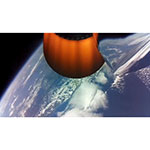The successful rideshare mission brings the total count of satellites deployed by Rocket Lab to 104
LONG BEACH, Calif.--(BUSINESS WIRE)--$VACQ--Rocket Lab, a leading launch provider and space systems company, has successfully launched its 19th Electron mission and deployed six spacecraft to orbit for a range of government and commercial customers. The mission, named �They Go Up So Fast,� also deployed Rocket Lab�s latest in-house manufactured Photon spacecraft to build flight heritage ahead of the upcoming CAPSTONE mission to the Moon for NASA.
The mission launched from Rocket Lab Launch Complex 1 on New Zealand�s Mahia Peninsula at 22:30, March 22, 2021 UTC, successfully deploying an Earth-observation satellite for BlackSky Global through Spaceflight Inc; two Internet of Things (IoT) nanosatellites for Australian commercial operators Fleet Space and Myriota; a test satellite built by the University of New South Wales (UNSW) Canberra Space in collaboration with the Royal Australian Air Force; a weather monitoring CubeSat for Care Weather Technologies; and a technology demonstrator for the U.S. Army�s Space and Missile Defense Command (SMDC). The mission took the total number of satellites deployed to orbit by Rocket Lab to 104.
After Electron successfully launched to an initial 550km circular orbit, the rocket�s integrated space tug or Kick Stage deployed its first five satellites to their individual orbits. The Kick Stage�s Curie engine was then reignited to lower its altitude and deploy the final small satellite to a 450km circular orbit. With its relightable Curie engine, the Kick Stage is unique in its capability to deploy multiple satellites to different orbits on the same small launch vehicle.
Following the deployment of the final customer payload on this mission the Kick Stage was reconfigured to Photon, Rocket Lab�s in-house built spacecraft. Photon Pathstone is equipped with new power management, thermal control, and attitude control subsystems that will be utilized for the CAPSTONE mission to the Moon for NASA later this year. Photon Pathstone is also testing on orbit new deep-space radio capability, an upgraded RCS (reaction control system), and sun sensors and star trackers.
Rocket Lab founder and CEO, Peter Beck, says: �Congratulations and welcome to orbit for all of our customers on Electron. Reaching more than 100 satellites deployed is an incredible achievement for our team and I�m proud of their tireless efforts, which have made Electron the second most frequently launched U.S. rocket annually. Today�s mission was a flawless demonstration of how Electron has changed the way space is accessed. Not only did we deploy six customer satellites, but we also deployed our own pathfinding spacecraft to orbit in preparation for our Moon mission later this year.�
Details about Rocket Lab�s 20th Electron launch will be announced shortly, with the next mission scheduled to take place from Launch Complex 1 within the next few weeks.
Images and video content: https://www.rocketlabusa.com/about-us/updates/link-to-rocket-lab-imagery-and-video/
About Rocket Lab:
As a global leader in launch, satellites and spacecraft components, Rocket Lab is transforming space access. Founded in 2006, Rocket Lab provides end-to-end mission services that provide frequent and reliable access to space for civil, defense, and commercial markets. Headquartered in Long Beach, California, Rocket Lab designs and manufactures the Electron and Neutron launch vehicles and Photon satellite platform. Since its first orbital launch in January 2018, Rocket Lab�s Electron launch vehicle has become the second most frequently launched U.S. rocket annually and has delivered 104 satellites to orbit for private and public sector organizations, enabling operations in national security, scientific research, space debris mitigation, Earth observation, climate monitoring, and communications. Rocket Lab operates launch sites in M?hia, New Zealand and Wallops Island, Virginia. To learn more, visit www.rocketlabusa.com.
Rocket Lab USA, Inc. (�Rocket Lab�) and Vector Acquisition Corporation (Nasdaq: VACQ) (�Vector�), a special purpose acquisition company backed by leading technology investor Vector Capital, announced on 1 March that they have entered into a definitive merger agreement that will result in Rocket Lab becoming a publicly traded company. The transaction is estimated to be completed in Q2 2021 and, at that time, Vector will change its name to Rocket Lab USA, Inc. and the combined company is expected to trade under the Nasdaq ticker symbol RKLB.
Forward-Looking Statements
This press release may contain certain �forward-looking statements� within the meaning of the Private Securities Litigation Reform Act of 1995, Section 27A of the Securities Act 1933, as amended, and Section 21E of the Securities Exchange Act of 1934, as amended, including statements regarding Vector�s, Rocket Lab�s or their respective management teams� expectations, hopes, beliefs, intentions or strategies regarding the future. The words �anticipate�, �believe�, �continue�, �could�, �estimate�, �expect�, �intends�, �may�, �might�, �plan�, �possible�, �potential�, �predict�, �project�, �should�, �would� and similar expressions may identify forward-looking statements, but the absence of these words does not mean that a statement is not forward-looking. These forward-looking statements are based on Rocket Lab�s current expectations and beliefs concerning future developments. Many factors could cause actual future events to differ materially from the forward-looking statements in this press release, including but not limited to: (i) the risk that the transaction with Vector may not be completed in a timely manner or at all, (ii) the failure to satisfy the conditions to the consummation of the transaction with Vector, including the adoption of the merger agreement by Vector�s shareholders, and (iii) the occurrence of any event, change or other circumstance that could give rise to the termination of the merger agreement relating to the transaction with Vector. There can be no assurance that the future developments affecting Rocket Lab will be those that we have anticipated. These forward-looking statements involve a number of risks, uncertainties (some of which are beyond Rocket Lab�s control) or other assumptions that may cause actual results or performance to be materially different from those expressed or implied by these forward-looking statements. Except as required by law, Rocket Lab is not undertaking any obligation to update or revise any forward-looking statements whether as a result of new information, future events or otherwise.
Contacts
Rocket Lab Media Contact:
Morgan Bailey
media@rocketlabusa.com












